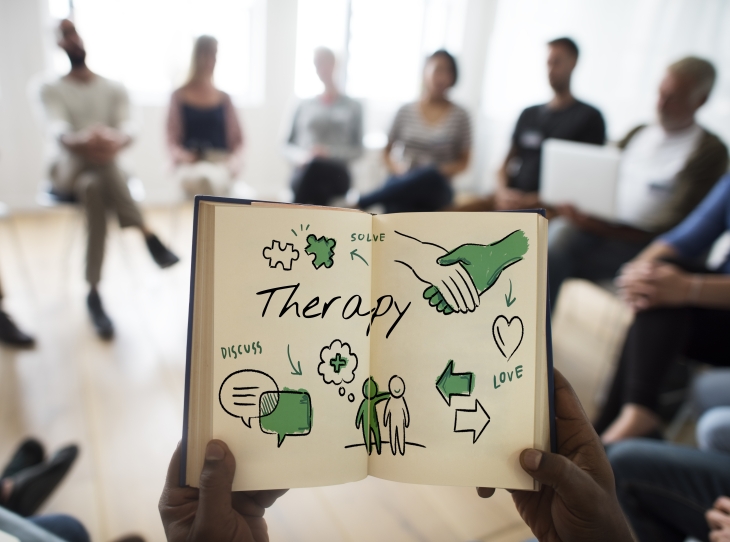
Addiction recovery group activities are wonderful tools for achieving and maintaining successful, long-term sobriety. They are a form of group therapy available free of charge all over the world, with no membership requirements (other than the desire to lead a life free of substance abuse).
What is a Recovery Support Group?
 There are many different treatments involved with the addiction recovery and relapse prevention processes.
There are many different treatments involved with the addiction recovery and relapse prevention processes.
But of all the different treatment methods, support groups may be one of the most valuable for both the treatment process itself and continued recovery post-treatment.
The term “support group” can be defined as a recovery modality designed to foster a sense of community among peers during and after drug and alcohol rehab. And support groups are able to assist in the treatment of both mental health and substance use disorders.
These groups support recovery by providing a judgment-free environment where members can show acceptance and offer validation.
How Do Addiction Support Groups Benefit Your Recovery?
Addiction recovery support group activities are conducted in a peer-to-peer format, so members have the comfort of knowing that everyone involved has an intimate understanding of what it’s like to have and recover from addiction.
Through honest, confidential discussion, recovery groups allow members to learn from one another’s experiences, vent and explore feelings that might otherwise reach a crisis point, and give and receive feedback on individual situations and challenges.
Group Therapy Activities for Adults in Recovery
As a way of encouraging recovery progress, or supporting continued recovery success, many support groups use specific activities to keep their members engaged.
Here are 36 addiction recovery group activities to consider using at your own meetings:
Have the group identify and discuss common triggers for substance abuse. Suggest different coping strategies they could use to stay sober when triggered.
Discuss some of the stereotypical ways men and women are expected to respond to painful feelings, such as women who are “drama queens,” and men who are “tough guys.” Which one does society see as more favorable? Can men be drama queens and women be tough guys? Are there qualities of these stereotypes that are actually positive, such as the drama queen’s candid openness, and the tough guy’s resilience?
Ask group members to introduce themselves by sharing three weird, funny, or interesting things about themselves as an “ice breaker” for one of your addiction recovery support group activities, .
Have a group lecture and/or discussion about the neuroscience of addiction.
Pass around a hat or a bowl, and have everyone place a slip of paper with a fear written on it inside. Have a group leader draw out the fears and read them one at a time for the group to discuss. How might a person develop such a fear? What kinds of things could they do to combat it?
Hold a discussion on gratitude. What is it? What do the group members feel grateful for? What are the benefits of gratitude and how can we experience more gratitude in life?
Pass out pieces of paper with drawings of a large bottle on them, and two lines are drawn across the bottle to create three different layers inside. Use the top layer to write three things about how you feel right now, use the middle layer for three ways you felt in the past, and use the bottom layer to “guess” at the deep feelings you try to hide from yourself. Make it clear that participants do not have to share anything they write, so they’ll feel free to explore potentially surprising emotions.
As one of your addiction recovery support groups activities, talk about relapse. What would be the consequences of abusing substances again? What would be positives of using again? What would be the negatives?
Discuss stress and stress management. Identify stressors and talk about ways to cope with them. Discuss the consequences of failing to cope. Discuss the upside to stress, i.e. the positive role that some forms of stress can play in your life.
Discuss the nature of mistakes and imperfections—can you make mistakes and still be a good person? Can you know that you are imperfect and still feel proud of yourself? On a piece of paper, write three to six sentences that state, “I might be [something negative], but [something positive],” i.e., “I might lose my temper easily, but I am learning not to take it out on others.”
Talk about heroes and role models. Who did you look up to while growing up? Are your current heroes the same or different? Are you able to see the imperfections in your heroes and still admire them? How can you use these role models to inspire your own recovery?
Have everyone write out a list of self-affirmation, then select one or more of these to share with the group. These can be general affirmations that might help anyone or targeted affirmations that celebrate the qualities that make you unique. Help group members who might be struggling with this by brainstorming affirmations for them.
If you could have a talk with your childhood self, what would you say? What advice would you give them? How might you direct them to live your life differently?
Ask the group to visualize themselves lost at sea in a storm at night. Just as they are starting to lose hope, they see a glimmer of light. Rowing hard, they use it to guide them to shore, where they are given dry clothes, a hot meal, and a cozy place to sleep. Imprint this image in your mind, or perhaps even draw a picture of it, so you can use it again for guidance in your real life.
Talk about mindfulness and the importance of living in the moment. How can staying present help in recovery? How getting caught up in what ifs, and things you can’t change, and things that may never happen, hurt recovery? How can you balance planning for the future with living in the moment?
Bring in a bunch of paper bags and pens or markers. Ask group members to decorate the outside of their bags with words and images that represent the self they show to the world. Decorate the inside of the bag with words and images that represent the hidden qualities that few people get to see.
What support systems do you have in your life? These can be people, activities, ways of thinking or anything at all that supports your continued recovery. How do you and other group members support each other? What else can you do to be open to giving and receiving support?
Talk about the importance of good nutrition. What are your healthy eating goals, if any, and how do you plan to meet them? What kind of relationship do you have with food? How can having a healthy relationship with food improve addiction recovery?
Talk about the importance of exercise and physical activity. What are your fitness goals, if any, and how do you plan to meet them? Do you get regular exercise? What are the benefits exercises can have for addiction recovery?
Talk about the importance of sleep. Do you get enough sleep? Do you get too much? Are there changes you need to make to improve in this area, and how should you go about it? Talk about the importance of good sleep hygiene (avoiding too much caffeine, avoiding screen time right before bed, getting up at the same time each day, etc.).
Draw or paint a picture of something in nature that has found a way to thrive in a harsh environment, such as a cactus in the desert, or tree roots bursting up from a sidewalk. Talk about your own resilience in the face of challenges, and how you might learn to be more resilient in the future.
Bring some brainteaser exercises and optical illusions to a meeting. After playing with them, transition into a discussion about the fallibility of our senses and point of view. Talk about how differently people perceive things based on who they are and the situation at hand.
Discuss the power of words, and how certain words and phrases can have a big impact on our feelings and behavior. Talk about the kind of words that can hurt and the kind that can lift you up. Can you think of any words that are strongly linked to your addiction? How can you use your word choices to help or hurt yourself and others?
Take a sheet of paper and write out three negative beliefs you struggle with, such as “you’re weak.” Then write out three positive responses to those comments, such as, “you get stronger every day,” or “you keep working hard, no matter what.” If anyone has trouble coming up with a positive response, ask for help from the group.
Talk about forgiveness and its importance. Think of someone in your life that you would like to forgive. What would you say to them? What would you hope they would say back?
Share with group members where you are in your recovery journey. Talk about your accomplishments and your goals. Ask for feedback and advice from the rest of the group.
Discuss self-care. Do you regularly do anything to care for yourself? What kinds of things can you start doing just to show yourself a little kindness? Why is it important to show ourselves kindness in this way?
Pass out pre-printed outlines of human silhouettes and markers or crayons. Have group members use images, colors, and words to show anger and emotional pain, such as a greenish ball in the stomach to represent guilt, or red squiggles over the eyes to show anger. Then draw healing and cooling images and words besides those emotions, such as music notes and the words “it’s not your fault.”
Make a list of the best and the worst moments in your life. Why do you label them as good or bad? What are the differences and similarities? Do you notice any patterns? Would you erase the bad moments from your life if you could, or have they given you something valuable that you want to hold onto?
Pretend that you are giving a speech to teenagers about the dangers of substance abuse. What stories would you tell them? What advice would you give them?
Think of emotional problems you face, such as depression or a bad temper. Then write about or discuss how these emotions might serve you, such as the way your depression forces you to slow down and rest when you’re overwhelmed. Then write about or discuss ways you can serve the same purpose in a more positive way, such as allowing yourself regular sessions of peaceful self-care to stave off overwhelm.
Discuss being alone. Can you be alone and not be lonely? What makes you feel lonely? What balance do you need between time spent alone and time spent with others to be content? What can you do to maintain that balance in your life?
Discuss how treatments for physical illnesses – like broken bones or infections – are similar to treatments for psychological illnesses like addiction. Brainstorm ideas for the ideal hospital or retreat to provide you with mental and emotional healing. Be specific.
Write out your usual routine. Add one activity that would help you improve your physical, emotional, mental, or spiritual health. For example, you might decide that you will exercise instead of sitting on the sofa while watching television. Tell members to report if they followed through at the next meeting.
Choose a bad memory to talk about with the group. Then discuss how, if you could, you would “fix” it by giving your past self tools such as knowledge, support, or assistance that could have improved or prevented the situation. Let the group participate in each memory “fix.”
Imagine that you are a car that needs a full tank of gas to get where you’re going. Your engine doesn’t run on gas, of course, but what does it run on? What activities, thoughts, events, people, etc., do you need to fill your tank so you can get where you need to go in life?

